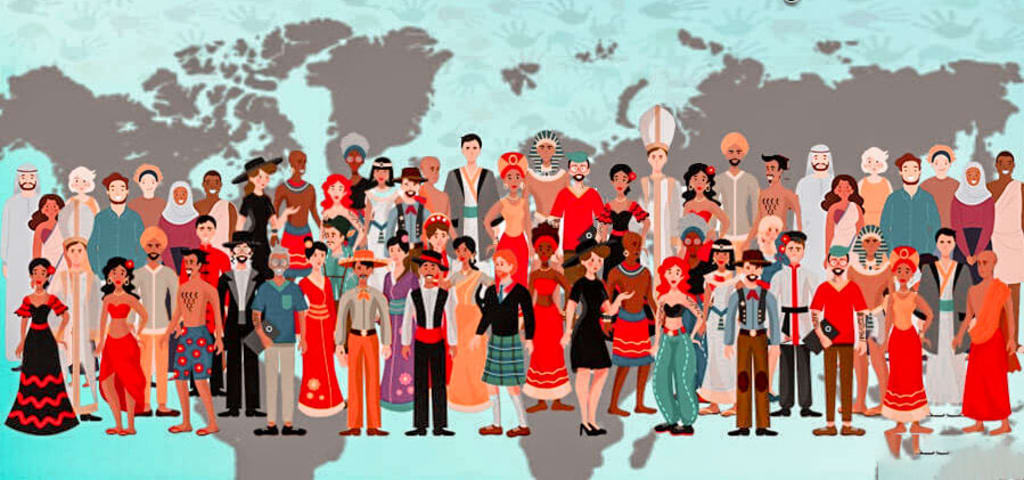Navigating the Mosaic of Race and Ethnicity
Understanding Diversity and Identity

Race and ethnicity stand as integral components of human identity, shaping experiences, perspectives, and interactions in profound ways. In the intricate tapestry of society, individuals navigate the complexities of racial and ethnic dynamics, confronting challenges and embracing the richness of diversity. This exploration delves into the multifaceted dimensions of race and ethnicity, unraveling their significance and implications within the human experience.
At its core, race refers to a socially constructed category based on physical attributes such as skin color, facial features, and hair texture. While these characteristics hold no inherent biological significance, they have historically been used to categorize and differentiate populations, often leading to the perpetuation of stereotypes and prejudices. Ethnicity, on the other hand, encompasses shared cultural traditions, values, and practices that unite individuals belonging to a particular group. Unlike race, ethnicity is more fluid and subjective, allowing individuals to embrace multiple identities and affiliations.
The intersectionality of race and ethnicity complicates their dynamics, as individuals embody multiple dimensions of identity shaped by factors such as nationality, religion, and socioeconomic status. For example, a person of African descent living in America may identify both with their racial heritage and their ethnic roots, which could be traced back to a specific country or cultural tradition. Similarly, individuals from immigrant backgrounds may grapple with the complexities of belonging to multiple cultural spheres while navigating the dominant culture of their adopted country.
One of the defining features of race and ethnicity is their role in structuring power dynamics and access to resources within society. Historically, racial and ethnic minorities have faced systemic discrimination and oppression, resulting in disparities in areas such as education, employment, healthcare, and criminal justice. These inequalities are often perpetuated by institutionalized forms of racism and xenophobia, which reinforce existing power structures and marginalize marginalized communities.
Despite these challenges, race and ethnicity also serve as sources of resilience, resistance, and cultural pride for many individuals and communities. Through collective mobilization and advocacy, marginalized groups have challenged oppressive systems and fought for greater recognition and inclusion. Movements such as the Civil Rights Movement, the Indigenous rights movement, and the fight for immigrant rights have paved the way for progress towards greater equality and justice.
In contemporary society, the discourse surrounding race and ethnicity continues to evolve, shaped by ongoing demographic shifts, globalization, and changing social attitudes. The rise of multiculturalism and diversity initiatives has brought increased visibility to underrepresented voices and perspectives, challenging traditional notions of identity and belonging. However, issues such as racial profiling, cultural appropriation, and systemic racism persist, highlighting the need for continued dialogue, education, and activism.
As we navigate the complexities of race and ethnicity in the modern world, it is essential to cultivate empathy, understanding, and solidarity across diverse communities. This requires confronting uncomfortable truths about privilege, power, and oppression, while also celebrating the richness of human diversity. By fostering inclusive spaces where all individuals are valued and respected, we can work towards building a more equitable and harmonious society for future generations.
In conclusion, race and ethnicity are fundamental aspects of human identity, shaping experiences, opportunities, and interactions in profound ways. While they have historically been sources of division and discrimination, they also hold the potential to unite and empower individuals and communities. By acknowledging the complexities of race and ethnicity and working towards greater understanding and inclusivity, we can strive towards a future where all individuals are afforded dignity, respect, and equality, regardless of their background or identity. It is imperative that we continue to engage in open and honest conversations about race and ethnicity, challenging biases and stereotypes, and promoting empathy and solidarity. Through collective effort and commitment to justice and equality, we can create a society where diversity is celebrated, and every individual has the opportunity to thrive.
About the Creator
Mohamed Ali
Mohamed Ali is a passionate writer and researcher with a keen interest in exploring the complexities of human behavior and society through the lens of sociology. With a background in sociology and psychology.






Comments
There are no comments for this story
Be the first to respond and start the conversation.